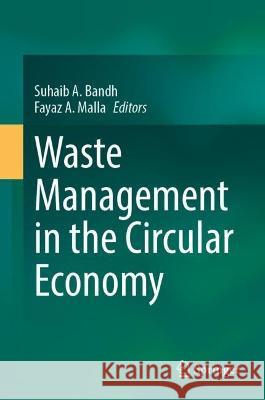Waste Management in the Circular Economy » książka



Waste Management in the Circular Economy
ISBN-13: 9783031424250 / Angielski
Waste Management in the Circular Economy
ISBN-13: 9783031424250 / Angielski
(netto: 585,86 VAT: 5%)
Najniższa cena z 30 dni: 539,74
ok. 16-18 dni roboczych.
Darmowa dostawa!
Waste to Energy in Circular Economy.- Resource Routes of Waste to Energy.- Valorization of Plastic Wastes in Circular Economy.- Valorization of Municipal Wastes in Circular Economy.- Biodegradable Wastes in bioeconomy.- Policy Interventions of Waste Management.- Water, Energy and Food Nexus in Circular Economy.
- E-Waste Management for Boosting Circular Economy.- Sustainable Development and Circular Economy.- Life Cycle Assessment in Solid Waste Management.-Circular economy in socio-economic development.- Politics of Wastes.- Integrated Waste Management and Circular Economy.- Integration of EIA in Circular Economy.
Dr. Suhaib A. Bandh is an Assistant Professor in the Department of Higher Education, Government of Jammu and Kashmir, India. He specializes in teaching environmental science at graduate and postgraduate levels. Dr. Bandh holds a PhD degree in Environmental Science from the University of Kashmir, Srinagar. He is a distinguished member of the Academy of Plant Sciences India and the National Environmental Science Academy.
With a remarkable track record, Dr. Bandh has been honored with numerous awards and has actively participated in several national and international conferences organized by renowned scientific bodies in India and abroad. His contributions to the field of environmental science are evident through his extensive publication record in highly esteemed and impactful journals. These publications not only showcase his scientific insight and exceptional experimental skills but also highlight his outstanding writing abilities.
Dr. Bandh's recent accomplishments include editing and authoring several books such as "Freshwater Microbiology: Perspectives of Lake Bacterial Dynamics," "Environmental Management: Environmental Issue, Awareness, and Abatement," "Perspectives of Environmental Science," "Climate Change and Microbial Diversity: Advances and Challenges," and "Climate Change and Microbes: Impacts and Vulnerability" published by reputable publishers such as ELSEVIER Inc USA, SPRINGER NATURE, CALLISTO REFERENCES, AAP/CRC, and A TAYLOR & FRANCIS GROUP. Dr. Bandh has also served as an editor for various special issues in leading journals, further solidifying his expertise and influence in the field.
Dr Fayaz A. Malla holds a PhD in Environmental Science from the Indian Agricultural Research Institute, New Delhi. He has a strong interest in waste management, pollution, and renewable energy as his PhD focused on the same issue. Moreover, he has also dealt with water conservation and management, water auditing, and water use efficiency in agriculture in the university. He has published many research articles in reputed, referred and impacted national and international journals. He has also presented many research papers in some national and international conferences. He has participated in several training organized by some reputed institute of India and abroad. Dr Fayaz has received prestigious National Junior Research Fellowship and PhD fellowship from Indian Council of Agricultural Research for perusing the M.Sc. and PhD at Division of Environmental Sciences, IARI New Delhi. He has also gained a vast research experience by working in multiple projects sponsored by international bodies like World Bank, NITI and JISL. Currently, Dr Fayaz is working a book Project Biofuels in Environmental Sustainability with ELSEVIER Inc USA. Dr Fayaz previously worked as a Research Associate with the Water resources division in The Energy and Research Institute (TERI) and is currently working as an Assistant Professor in the Higher Education Department Government of Jammu and Kashmir at Government Degree College Tral.
This book offers a comprehensive and insightful exploration of the technologies and processes involved in energy generation through waste treatment. It serves as a valuable resource, providing all the necessary information and tools for selecting the most sustainable waste-to-energy solution in various conditions. Moreover, it delves into real-life examples of the circular economy in action, offering a comprehensive overview from multiple perspectives. It employs a range of methodologies, including lifecycle assessment, sustainability assessment, multi-criteria decision-making, and multi-objective optimization modes. By combining these approaches, it offers a robust framework for evaluating waste-to-energy options.
Furthermore, the book provides a thorough overview of waste-to-energy feedstocks, technologies, and implementation. It goes beyond mere description, delving into the critical factors and key enablers that influence the sustainable development of the waste-to-energy industry. By addressing these factors, the book facilitates the transformation towards a circular economy, moving beyond the traditional "call to arms" approach.
This book is an invaluable resource for researchers and policymakers in the energy sector. It equips them with the scientific methodology and metrics necessary to develop strategies for a viable sustainability transition. Additionally, it serves as a key reference for students, researchers, and practitioners seeking to deepen their knowledge of energy planning and the current and future trends of biofuel as an alternative fuel.
1997-2026 DolnySlask.com Agencja Internetowa
KrainaKsiazek.PL - Księgarnia Internetowa









